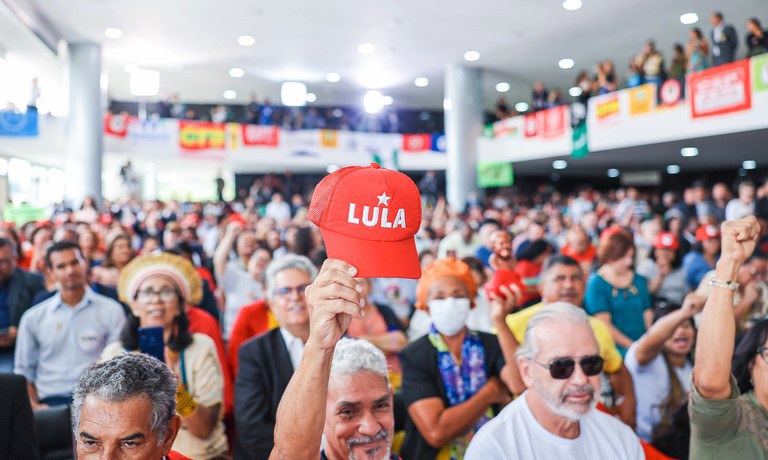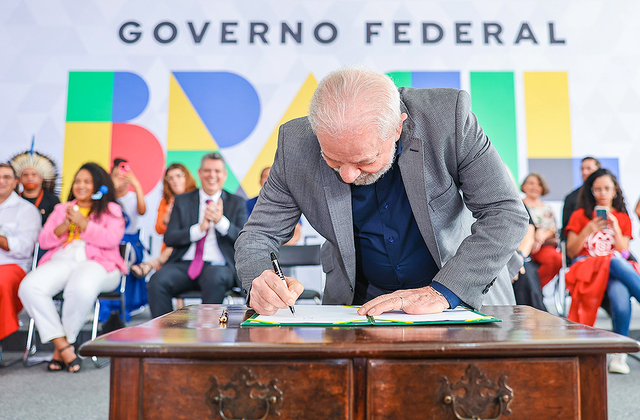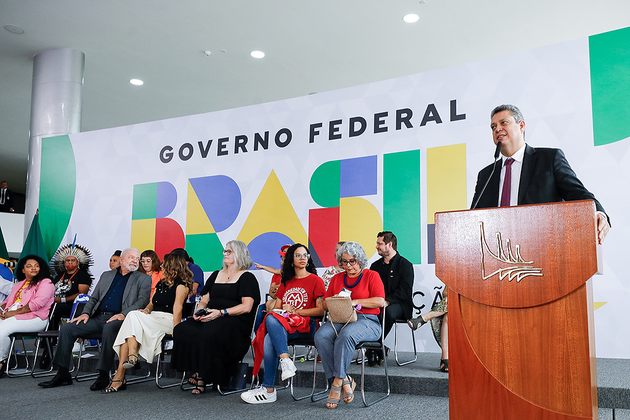Notícias
INTERMINISTERIAL
Brazilian government establishes a social participation council and reinstates its dialogue with social movements

PR/Ricardo Stuckert
Originally published on Jan.31, 2023
Brazil’s federal government has reestablished dialogue with social movements that were abandoned following consistent dismantling of popular participation structures within the public sphere over the last few years. On January 31, President Luiz Inácio Lula da Silva signed two decrees that create the country’s Social Participation Council (Conselho de Participação Social) and Interministerial Social Participation System (Sistema de Participação Social Interministerial). Both bodies are focused on permanent communication with popular movements and civil society organizations towards development and assessment of public policies.
Minister Márcio Macêdo – head of the General Secretariat of the Presidency – attended the ceremony at the Planalto Palace, in Brasília. Congressmen, ministers and representatives of social movements were also present. The Council will be chaired by President Lula, alongside Macêdo as Executive Secretary and deputy in Lula’s absence.

Foto: Ricardo Stuckert (PR)
"Meetings such as this one are extremely gratifying", said Lula, adding that "we must keep in mind that this is the first meeting of an organization of Brazilian people to help this government and to make demands, so that we can actually do what we have to do". According to the president, the Council will reestablish "effective popular participation" in which all movements will be treated on equal terms.
Minister Márcio Macêdo highlighted that social participation is crucial to a democratic state based on the rule of law; to the quality of public services; and to citizenship. "As a fundamental right, social participation must be guided by the principle of direct democracy, social control and transparency, broadly involving organized sectors and mainly the most vulnerable – who need sensitive state action", he said. According to the minister, the General Secretariat of the Presidency is "the central body of the National Social Participation Policy [Política Nacional de Participação Social]".
FROM TRANSITION TO PRESIDENCY — Established during the government transition, the Social Participation Council was one of the technical thematic groups that were created at the time, and brought together social movements, civil society, and other political and social articulation entities representing the entire country. The group produced a detailed diagnosis of social participation in Brazil over recent years, and presented ideas for the resumption of institutional mechanisms and popular participation instruments towards public policy development and control.
Among these proposals was reformulation of the General Secretariat of the Presidency’s structure. Presently, it focuses on coordinating dialogue with civil society. According to Márcio Macêdo, the Council will bring together 68 representatives of movements and entities — communicating with the federal government — and convene every three months. No remuneration is involved: members will act by providing relevant public services.

Foto: Ricardo Stuckert (PR)
CROSS-CUTTING MANAGEMENT — In order to ensure cross-cutting policy management, a Social Participation and Diversity Office was established within each Ministry. These offices will be open to demands from social movements, manage relevant participatory instances and act as focal points for the General Secretariat’s cross-cutting activities.
Simone Nascimento, national coordinator of the Unified Black Movement (Movimento Negro Unificado/MNU) and member of the executive coordination of the Social Participation Council in the Transition Cabinet, highlighted how these efforts are important to a truly participatory democracy. "Without popular participation we won’t be capable of rebuilding democracy in Brazil. We hope the Council will be an effective and constant tool for conversations with you, Mr President, and with the minister – and that the Interministerial Social Participation System will be a permanent channel for making our demands heard. May the needs of the working class, represented by the movements that will make up the Council, be truly acknowledged", she said.
Popular Movements Center (Central de Movimentos Populares/CMP) coordinator and Brazil Popular Front (Frente Brasil Popular) member Raimundo Bonfim mentioned the ceremony’s symbolism following the recent attacks on Brazilian government headquarters. "After the coup attempt on January 8, it’s the first time that representatives of Brazilian peoples’ great diversity steps into the Planalto Palace. This ought to make Brazilian people proud. This act – signing this social participation decree – is extremely symbolic", he said.